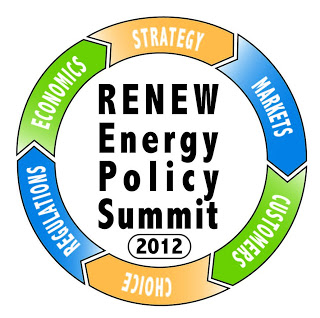From a report by Alex Brasch on RENEW’s Energy Policy Summit:
MADISON, Wis. – Can local governments work together with citizen action groups to effectively transition America away from reliance on fossil fuels? The answer in Wisconsin and Colorado seems to be yes.
Members of Wisconsin’s renewable energy industry convened in Madison for the RENEW Wisconsin Energy Policy Summit last week. The diverse crowd of renewable energy manufacturers, installers, state utilities, environmental advocacy groups, university representatives, and government officials, including Dane County Executive Joe Parisi and Madison Mayor Paul Soglin, came together to focus their efforts on retaking the initiative in the fight for a more sustainable energy future for Wisconsin.
Members heard from keynote speaker Leslie Glustrom, a biochemist who belongs to a similar organization in Boulder, Colo. – a group that recently led a successful ballot initiative to authorize creation of a municipal utility in that city.
Don Wichert, founder of RENEW and former chief of energy resources with the Wisconsin Department of Administration and current director of renewable energy services at the Wisconsin Energy Conservation Corporation created the advocacy group more than 20 years ago to address government officials about clean energy development in the state.
Wichert said Wisconsin spends nearly $6 billion per year on imported coal, petroleum, and natural gas. “As a renewable energy advocacy group composed of concerned citizens, clean energy businesses, environmental organizations, and government employees, RENEW Wisconsin seeks to change the way people think about and consume energy through a combination of advocacy, education, and creative partnerships with state and local governments, businesses, utilities, and citizen groups,” Wichert said.
Michael Vickerman, long-time executive director of RENEW, expressed optimism that, “despite current rollbacks of renewable energy policies, including the suspension of clean energy incentives and a weakening of state laws that leverage utility-purchased renewable energy, there is still a network of supportive local officials throughout the state.” He challenged advocates to resist acquiescing to the current political situation, and instead, use the sum influence of the clean energy industry, including non-profits and concerned citizens, to drum up support for clean energy development. Vickerman provided three guiding principles as a springboard to start discussion on how to retake the initiative.
First, reframe the message by presenting the industry’s true potential as a group of highly-motivated, dynamic organizations with a unifying business plan that will generate green jobs. Second, assert the fact that renewable energy is something intensely desired by businesses and citizens, because it gives customers more options, businesses increased market appeal, and a surefire pathway to more local jobs. And finally, pursue community-owned renewable projects that will keep energy production local and redirect investment into the area economy.

